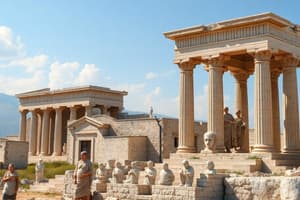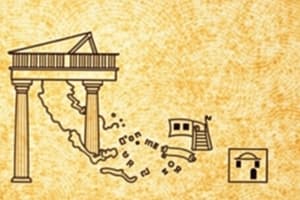Podcast
Questions and Answers
What does the term 'polis' mean?
What does the term 'polis' mean?
It can also mean a body of citizens. In modern historiography, polis is normally used to indicate the ancient Greek city-states.
What is the definition of the Greek polis?
What is the definition of the Greek polis?
A tight-knit, small community of ancient Greek citizens who agreed on certain rules and customs.
What was the typical structure of a community in ancient Greece called?
What was the typical structure of a community in ancient Greece called?
Polis
Why was the Greek polis important?
Why was the Greek polis important?
Who was Homer?
Who was Homer?
What does the name Homer mean?
What does the name Homer mean?
What is the greatest contribution of Homer to Greek culture?
What is the greatest contribution of Homer to Greek culture?
What is Euripides best known for?
What is Euripides best known for?
What city is the capital of Greece?
What city is the capital of Greece?
What was Athens famous for?
What was Athens famous for?
Who are the ancient Athenians?
Who are the ancient Athenians?
What ancient Greek city-state was known for its militaristic government?
What ancient Greek city-state was known for its militaristic government?
Who founded Sparta according to ancient Greek tradition?
Who founded Sparta according to ancient Greek tradition?
Flashcards are hidden until you start studying
Study Notes
Polis
- Term used to describe ancient Greek city-states, notably including Classical Athens.
- Represents a tight-knit community of citizens agreeing on customs and rules.
- Typically centered around a small urban area, with a surrounding countryside (chora).
Importance of the Greek Polis
- Body of citizens became the most significant aspect of the term "polis."
- Citizens referred to themselves using terms like Athenians and Lacedaemonians instead of just naming the cities.
Homer
- Renowned ancient Greek poet known for the epic poems, "The Iliad" and "The Odyssey."
- Traditionally believed to have been blind; regarded as highly influential in literature.
Historical Significance of Homer
- Name derived from Greek "Ομηρος" (Homeros), meaning "hostage" or "pledge."
- His works detail significant events like the Trojan War and the adventures of Odysseus.
Influence of Homer on Greek Culture
- Provided a unified set of values reflecting Greek self-perception.
- Established models of heroism and the ideal life, influencing social and aristocratic standards.
Euripides
- Acclaimed ancient Greek dramatist known for tragedies such as "Medea," "The Bacchae," and "The Trojan Women."
- Often incorporated the deus ex machina device to resolve narratives.
Major Works of Euripides
- Renowned for innovative storytelling, altering traditional myths and depicting the flaws of heroes and gods.
Athens
- Capital and largest city of Greece, located in east-central Greece on the Attica plain.
- Named after Athena, its patron goddess; serves as a cultural and economic hub.
Athens' Prominence
- Known for the Acropolis and the Parthenon, housing a statue of Athena and symbolizing Athenian grandeur.
- A leading city of ancient Greece, particularly influential in the 5th century BC.
Ancient Athenians
- Emerged as the foremost city of ancient Greece, significantly shaping Western civilization.
Sparta
- Ancient Greek city-state known for a militaristic society and rigorous citizen training.
- Defeated Athens in the Peloponnesian War (431-404 BC), resulting in its temporary dominance.
Decline of Sparta
- Suffered significant casualties in war; lost its influence after defeat by Thebes at the Battle of Leuctra in 371 BC.
Founding of Sparta
- According to Greek tradition, founded by Lacedaemon, a son of Zeus and the mortal Taygete.
Studying That Suits You
Use AI to generate personalized quizzes and flashcards to suit your learning preferences.




